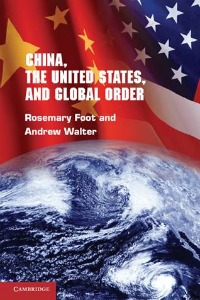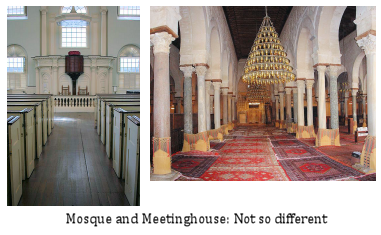
The seeds of a green spring: young leaders meet in Oxford to debate Pakistan’s future
For three days (February 3-5) Oxford University was the venue for the Pakistan Future Leaders’ Conference (PFLC), attended by some 300 student-delegates hailing from around 50 universities and colleges in the United Kingdom. This major event was organised by Oxford University’s Pakistan Society, in collaboration with the Oxford Union, and the Pakistan societies of Cambridge University and the School of Oriental and African Studies. Such a large gathering of young Pakistanis in Oxford was reflective of an emerging ‘youth moment’ currently setting the course of politics in Pakistan. Cricketer-turned-politician Imran Khan, who is also an Oxonian, has already tapped into this phenomenon. His recent political rallies in Lahore and Karachi attracted exceptionally large crowds of younger people, forcing the country’s …

China, the United States, and Global Order: An Interview with Professor Rosemary Foot
Rosemary Foot is a Professor of International Relations and John Swire Senior Research Fellow at St Antony’s College, Oxford. She has been a celebrated China scholar since completing her doctorate at the London School of Economics on Sino-Soviet relations and West Asia. Here, Professor Foot takes a moment to speak with Politics in Spires regarding her most recent book. Congratulations, your latest book, China, the United States, and Global Order has been praised by Foreign Policy Magazine as one of the 23 Essential Readings of 2011. Could we begin with you telling us a bit about the efforts behind this work? The book was a collaborative effort.* My co-author [Andrew Walter] is a specialist in international political economy, and I …
US Military Finances Research on Rape in DR Congo
Margot Wallstrom, the United Nation’s special representative on sexual violence in conflict, referred to the Democratic Republic of Congo (DRC) as ‘the rape capital of the world’. If my Google search was any indication (registering a disturbing 4,640,000 hits for the term), the sensationalist phrase stuck among members of the civil society and aid agencies in the Global North. The eastern DRC has alternately been described as ‘the worst place in the world for women’ by The Guardian and ‘hell’ by American feminist playwright Eve Ensler. US Secretary of State Hillary Rodham Clinton called rape in the DRC ‘evil in its bases form’ during a visit to the region in 2009. There is something to be said about the damaging …

Many Trails to Freedom: Islamic Democracy is not an Oxymoron
“I disapprove of what you say, but I will defend to the death your right to say it.” – Voltaire. Over Christmas I visited Boston and had the occasion to walk the famous freedom trail: 3 miles of sights commemorating American independence. As I walked this hallowed ground I pondered on those fighting for freedom today, in the streets of Cairo, Homs and Tunis. Having met some of these people, I wondered at the suspicion we direct at the Islamic parties now gaining power, as if we forgot our own history. American democracy was born of Puritan principles of self-government, but that did not prevent it from evolving into the (more or less) secular body it is today. Ignoring this …
Resource control: Right or Privilege?
‘Resource control is a right. It is not a privilege’ -A member of a peaceful youth rally in the Niger Delta, from the film Sweet Crude. In the first couple of minutes of the opening of the film, Sweet Crude, director, Sandy Cioffi, discloses, ‘this is not the movie I intended to make’. She had travelled to the Niger Delta to film the building the Niger Delta Friendship Library, which was to serve as a ‘symbol of peace’ in the region. While traveling, visiting and listening to local voices, the true value of this library as an empty symbol was revealed. Sandy says, the ‘reality of their lives are far more complex than a community library. Knowing them would change …
What Obama didn’t say about Iraq
The Iraq war was not a success. It was a failure. A dismal failure, and Western governments should learn from their mistakes. Of course, nobody can deny the brutal crimes that Saddam Hussein was responsible for. The savage attacks against the Kurdish population in Northern Iraq, the invasion of Kuwait and the terrorising of innocent civilians in the town of Dujail after an assassination attempt serve as prime examples of the sadistic nature of the Iraqi dictator. The world is definitely safer without him, but this in no way outweighs what the world, and in particular the Iraqi people, have had to give up. Transparency International’s most recent Corruption Perception Index (measured in 2010) ranked Iraq as having 175th most …
China’s Politics of Tobacco Control
Recognizing that tobacco consumption has become a leading cause for premature death worldwide, the international community, under the auspice of WHO, successfully developed the Framework Convention on Tobacco Control (FCTC) with unanimous adoption by the 192 member states in May 2003. It is the first time that the Organization has used its constitutional right to develop an internationally legal instrument in global health governance. Therefore, it is a seminal event in global health. It also represents an unprecedented collective action to curb the global tobacco epidemic. The convention came into force in February 2005. With 174 party members covering 87% of the World’s population, the FCTC has been among the most widely and rapidly embraced international conventions devoted to health …
Federalism in Nigeria: Contextualising Boko Haram and the Fuel Subsidy
When Boko Haram killed nearly 70 civilians over the Christmas holidays, many observers in the Western media were quick to chalk it up to wanton Islamic extremism. The attacks, it was concluded, reflected global jihadist activity. Emphasis was placed on the group’s links to al Qaeda. This narrative is shortsighted. For one, it ignores Christian retaliation just days later, including the bombing of a madrasa that injured seven. More broadly, it decontextualizes the violence. Nearly 500 Nigerians were killed in the northeast in 2011 due to sectarian conflict. Suicide attacks, car bombings, and assassinations-by-machete have been documented throughout the country, Africa’s most populous and the linchpin of Western engagement with the continent. Such killings are not new to Nigeria: religious strife has been a constant for decades, …









